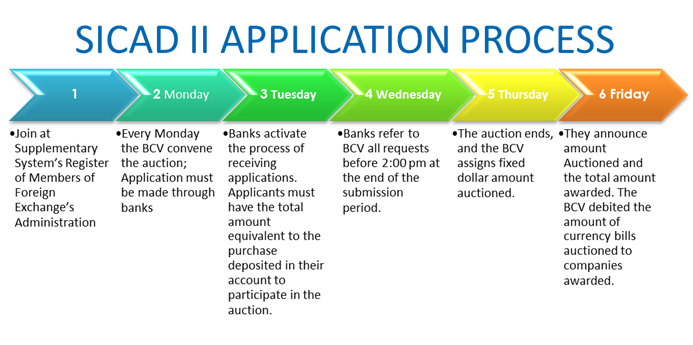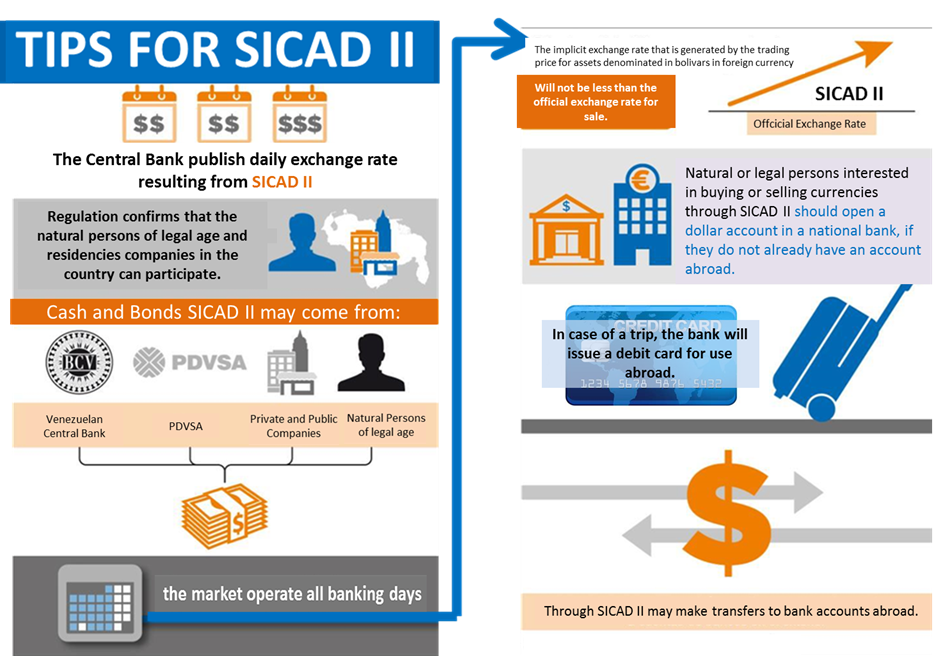The Government of Venezuela recently introduced SICAD II. This is the third program of its kind is designed to ease the access to foreign exchange. SICAD II comes with great expectations and some concerns about its procedures and results.
According to the Economist, “Here’s a simplified outline of the country’s foreign-exchange system. A dollar will cost you 6.3 bolívares if you are the government, or if you can persuade Cencoex (the government’s foreign-trade body) that you intend to import vital goods such as food or medicine. Then there’s the Sicad I rate, currently just over 10 bolívares to the dollar, but contingent on irregular, “auctions” (which are nothing of the sort). The new Sicad II process, which is as close to a free market as the government will allow, opened at a whopping 50 bolívares to the dollar. But even that is a bargain compared with the unofficial exchange rate, which at the time of writing stands at almost 68 bolívares.”
So, if you operate in Venezuela, how do you actually apply for the exchange? Here is what you need to know about the exchange apparatus and the barrier to entry.
Regulations Related to SICAD II:
- SICAD II became effective through Exchange Agreement No. 27 issued in the official Gaceta No. 40,368.
- According to Agreement No. 27, article 3, it allows natural and/or legal persons engaged in the export of goods and services to retain and manage up to 60 percent of the income they receive in currency exchange for their export activity. The funds are to cover their costs of goods and transport, other than financial debt, in order to carry out sales transactions.
Who can participate in SICAD II?
- Both natural and legal citizens are allowed to legally buy and sell foreign currency in securities or cash through authorized exchange operators. These operators will be under the supervision of the Central Bank of Venezuela (BCV) and the Economics, Finance and Public Banking Department.
- The participants of SICAD II may also take part in Cencoex’s allocations or the auctions of Complimentary System of Foreign Currency Acquirement (SICAD I), but there will be a list stating what are the imports authorized in each different rate.
- The Central Bank of Venezuela and Petróleos de Venezuela (Pdvsa) will be the bidders in SICAD II, as well as all financial and non-financial companies of the State.
- Private companies are also allowed the offering of dollars, provided they demonstrate the lawful evidence of their source of foreign exchange.
Requirements to Participate:
Both natural and legal citizens shall be residents in the country in order to carry out the acquisition; however, selling of foreign currency from abroad or from the country through national accounts is allowed.
Natural citizens: To buy or sell foreign currency in the exchange market, the individual must have bank account in U.S.D. within Venezuela; they must submit their identity card (or passport) and the RIF, updated and in good standing and finally. It a signed affidavit stating the origin and destination of the funds is also required.
Legal citizens: They too must have an account in U.S.D, the original RIF, and a copy of the RIF (updated and in good standing) and the affidavit stating the origin and destination of the funds.
About the Procedure of SICAD II:
- The exchange rate fluctuates as the price of foreign exchange is given by the bid created by the market.
- The BVC is responsible for publishing the daily exchange rate. Banks and brokers must publish the rate in a visible place on their premises.
- The daily activities in this parallel currency market (except for bank holidays) are performed in the following time frame: From 8:30 am to 11:30 am both natural and legal citizens may submit their offers and requests. From 9:00 am to 1:00 pm the system will be processing the transactions.
- Those who acquire foreign currency through deceptive or fraudulent means, shall be sentenced from three to seven years in prison and shall pay a fine that would be twice the amount of the exchange transaction (in Bolivars).



